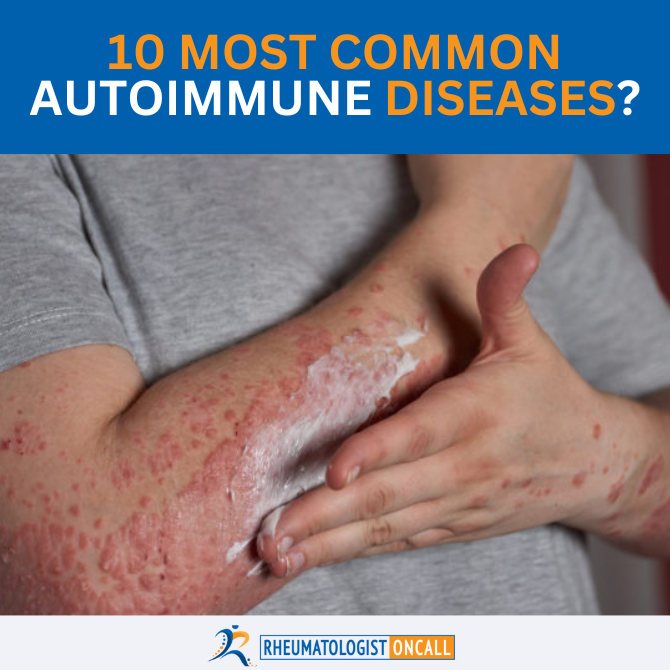SHARE
Did you recently get a referral to a rheumatologist, but you are confused about what they do? What do they treat? Many patients have never heard about a rheumatologist. This article will dive into the fascinating world of most common autoimmune diseases and explain to you the top ten conditions that I, as a rheumatologist, specialize in treating.
What are Autoimmune Diseases?

Autoimmune diseases occur when the body’s immune system, which is meant to protect us, mistakenly attacks healthy cells and tissues. These conditions can affect various organs and systems, leading to a wide range of symptoms from fatigue to joint pain, rashes, muscle pain, or even lung and kidney disease. Rheumatologists are specialists in SOME, but not all, autoimmune diseases. Other specialists like neurologists specialize in treating autoimmune diseases affecting the nervous system, like multiple sclerosis or myasthenia gravis. Or there are specialists in autoimmune diseases that affect the gut, like Crohn’s disease or Ulcerative colitis. These are gastroenterologists. Or some specialists treat autoimmune diseases of the kidneys, like Goodpasture or ANCA vasculitis, these are called nephrologists.
As a rheumatologist, let me share with you the most common autoimmune diseases I treat in my clinic, Rheumatologist Oncall.
#1 Rheumatoid Arthritis
Rheumatoid arthritis (RA) is one of the most well-known autoimmune diseases. It primarily affects small joints like the hands and feet, causing pain, swelling, and stiffness. However, Rheumatoid arthritis can affect many other organs, especially the heart, lungs, skin, and eyes. On my YT channel, you will find many educational videos about rheumatoid arthritis, from signs, symptoms, and complications to treatments and important lifestyle changes like exercises, foods, and the best supplements.
#2 Psoriatic Arthritis
Psoriatic arthritis is an inflammatory type of arthritis that usually happens after many years of skin psoriasis. About 20% of patients with skin disease will develop Psoriatic arthritis/ psoriatic arthritis in 10 years. I am very passionate about Psoriatic arthritis because many people who suffer from this disease get misdiagnosed for many years, and consequently, they get mistreated many times.
Why?
Because when you have psoriasis, and you go to see a dermatologist, or a skin doctor, most of the time, you do not think to mention the joint pain…..and when you mention the joint pain, many times, if the skin psoriasis is not a big issue, you and the doctor do not think about these as they could potentially be related.
That is why many patients that complain about joint pain, are referred to an orthopedic specialist, and they get treatment that might be just for the joints but will not treat the systemic problem…. Yes, psoriasis and Psoriatic arthritis are systemic diseases.
Psoriatic arthritis causes joint, spine, and tendon pain and can even affect the eyes, causing inflammation called uveitis/ iritis.
As a Rheumatologist, I work closely with my dermatologists to develop a comprehensive treatment plan and help patients with PsA to get better and stop the damage that this disease can cause to their skin, joints, spine, tendons, and eyes.
#3 Systemic Lupus Erythematosus (SLE) & Mixed connective Disease
Systemic Lupus Erythematosus, or SLE, is a complex autoimmune disease affecting multiple organs, including the skin, joints, kidneys, lungs, and heart. Rheumatologists play a vital role in diagnosing and managing SLE, helping patients control inflammation and minimize organ damage. This is a complex disease; ensure you have a specialist on board to follow you very closely. Mixed Connective Tissue Disease, or MCTD, combines features of various autoimmune diseases, including lupus, scleroderma, and polymyositis.
#4 Sjögren’s Syndrome
Sjögren’s syndrome is an autoimmune disease that was initially recognized due to excessive eye and mouth dryness. This is another disease that I am passionate about, as Psoriatic arthritis is many times not recognized and not treated appropriately. Many patients have other symptoms like headaches, tingling, numbness, and shortness of breath, among others…. that have been disregarded for years. If you check my Youtube channel, you will again see many educational videos that patients receive very well.
#5: Systemic Sclerosis
Systemic sclerosis, or scleroderma, is a rare autoimmune disease that primarily affects females, rarely men, and will thicken and harden the skin and internal organs like the lungs, heart, and gastrointestinal tract. Different forms of systemic sclerosis are limited (usually, the thickening of fibrosis can happen only at the skin level) vs. diffuse, meaning the thickening/ fibrosis affects both the skin and the internal organs. This is a very serious disease, and you will need a trained rheumatologist to keep an eye on all of the possible aspects of this disease. There is a huge effort in the rheumatology research community to come up with new treatments for this disease, including bone marrow transplant as an option.
#6: Ankylosing Spondylitis
Ankylosing spondylitis is another inflammatory arthritis that primarily affects the spine and sacroiliac joints, causing inflammation, pain, and stiffness. This disease can also affect the tendons and the eyes, causing inflammation. Many patients with Ankylosing spondylitis can have a genetic predisposition to develop this disease and have a marker like HLA-B27 positive. This marker does not make the diagnosis, but it will help with the signs and symptoms and the X-rays/ MRI studies to make the diagnosis.
#7 Vasculitis
Vasculitis is a group of conditions characterized by inflammation of the blood vessels. There are many types of vasculitis, and how we, Rheumatologists think about these depends on the type of vessel they get involved in. So we have 3 big categories:
Vasculitis is a very serious condition!
Patients with vasculitis can have many symptoms, sometimes very confusing symptoms, that can involve multiple organs, most of the time at the same time. From skin rashes to fevers, weight loss, eye inflammation, vision loss to lung, heart, and severe kidney failure. Many patients with vasculitis are severely sick and can easily end up in the intensive care unit. So many are sure you ask the help of an experienced rheumatologist if you deal with severe symptoms of vasculitis. We treat these diseases, which can be intense and difficult. That is why I always stress the importance of getting to a specialist when you feel that you need it, not in 3 or even worse in 6 months. That is why I started my company, Rheumatologist OnCall, to break the geographical barriers and allow patients to be seen when they most need it when they feel sick.
#8 Polymyalgia Rheumatica
Polymyalgia rheumatica is a disease primarily affecting older individuals, usually over 50. It may cause muscle pain, stiffness, especially in the upper part of the upper and lower extremities. Some wake up one morning and can’t move because they are stiff!
You may also develop other symptoms like jaw pain when you chew food or severe headaches over the temporal area. Even vision loss….and with that, let me introduce you to the #9 autoimmune diseases that I, as a rheumatologist, treat in my practice. This is called Giant Cell Arteritis (GCA)
#9 Giant Cell Arteritis (GCA)
GCA is a type of large vessel vasculitis that can affect the vessels in your brain. This is a very serious condition that requires URGENT treatment. So if you start developing severe temporal area headaches and do not have a history of headaches, call your doctor or go immediately to the emergency room. Some patients initially develop symptoms that look like PMR. They develop symptoms of GCA like headaches (involving other parts like the occipital area), jaw pain when chewing food, and acute and sudden vision loss even for a few seconds. Again, go to the ER to be evaluated immediately and receive treatment.
#10 Polymyositis/ Dermatomyositis
The last group of diseases I will discuss today, also commonly treated by rheumatologists, are Polymyositis and Dermatomyositis.
Polymyositis is an autoimmune disease characterized by inflammation of the muscles, leading to muscle weakness, pain, and fatigue. Dermatomyositis is an autoimmune disease that involves both the muscles and the skin, causing some rashes that are specific for this disease; these rashes can be present around your eyes, chest, back, on the thighs or the hands, elbows, and knees. As rheumatologists, we are trained to recognize, diagnose and treat these diseases. I also have a video on my youtube channel if you want to learn more about Dermatomyositis.
Conclusion
From rheumatoid arthritis to psoriatic arthritis, Sjögren’s syndrome, Lupus, Polymyalgia Rheumatica, Giant Cell Arteritis, and other types of vasculitis, I am here to help you diagnose and treat these conditions. Remember, if you suspect you have an autoimmune condition, do not consult DR. Google or do not take advice from people on social media or so-called “Autoimmune experts”! Find an experienced physician who diagnoses and treats people with autoimmune diseases daily. Do your research and find a specialist who can help you decipher your diagnosis, someone who will take time and try to help you!
Through my company, Rheumatologist OnCall, I have been able to help many patients that were wondering if they have or not an autoimmune disease in many US states. If you need help, don’t hesitate to check out my website, and if needed, schedule an appointment from the comfort of your home, again when you need it the most, not in 3- 6 months, and it may be too late for you or a loved one.














